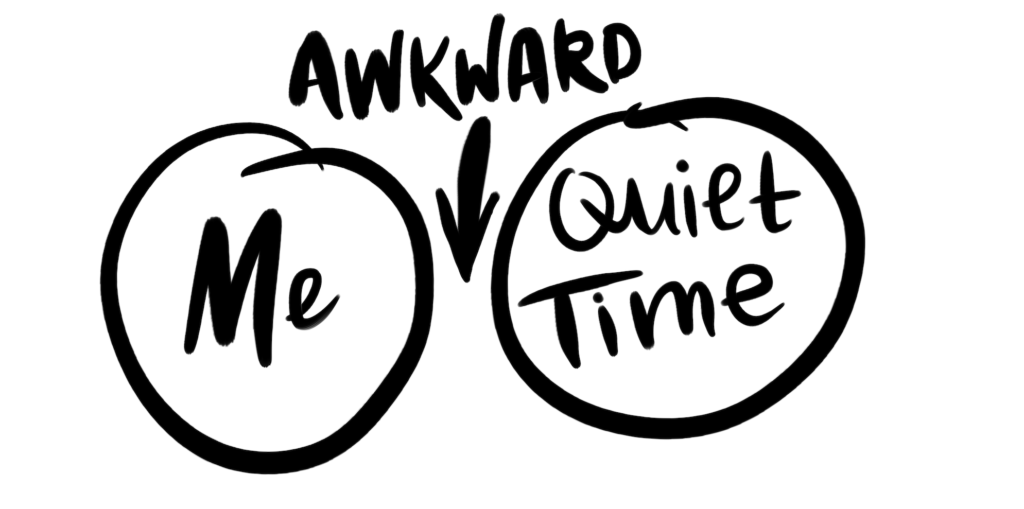
If I had a nickel for every time I did NOT read my Bible, I’d be a very rich woman. Just last Good Friday, after resolving to read my Bible each day during Holy Week, I found myself procrastinating and anxious, putting off doing the very thing I knew would make the day feel meaningful. I wanted to read….and I also did not want to.
Our motivation and willpower is complex, so I don’t claim to have all the answers to Paul’s famous lament in Romans 7:15—” I do not understand what I do. For what I want to do I do not do, but what I hate I do.” (I always want to add doo-doo-de-doo because apparently, I’m a junior high student.) But I do think figuring out why we put off these disciplines is a helpful first step to drawing close to God. If nothing else, honesty brings intimacy.
So here are a few reason why we avoid good disciplines—and a few ways to counteract that.
1. Prayer or Bible reading makes you feel worse than not doing it.
I used to think spiritual disciplines hurting your faith was an oxymoron, despite the fact that it happened to me all the time. I would try to pray and feel more panicky. Or, I would read the Bible, and a difficult passage I didn’t understand made me doubt my faith more than I did before I started. The Bible is often a hard book to understand; you’re not alone if you find some of its passages off-putting (Judges 19, I’m talking about you).
Try this instead:
Investigate why you have such a deep aversion to prayer or certain passages in the Bible. Given how much sexual assault has hurt people I love, it’s not too surprising that reading a book written in a very patriarchal culture often rubs me the wrong way. Ditto on passages that were used to shame me, or that remind me of other kinds of abuse I’ve suffered.
Prayer is also a super-vulnerable activity—that’s why it’s so powerful. If you’ve been traumatized, you may need to heal before you can do it without harming yourself. Get therapy and be really honest with yourself about why prayer triggers negative feelings.
It’s pretty normal to have baggage about spiritual disciplines. People with eating disorders might struggle with fasting. Those coming out of abusive churches may struggle to sit in a pew. It is OKAY to have negative reactions to things that others do happily. God is present within our brokenness, and is ready and able to accept you on whatever level you can manage.
You might also look to the suggestions on the next problem, which is:
2. You find prayer or Bible study boring, tiresome, or irrelevant.
When I was in college, I wrote all my prayers out long-hand. I even got compliments on it—some of my peers (including a guy I liked, ahem) told me how Ggodly I must be to take prayer so seriously.
Well, honestly, writing those prayer bored me while I was doing it, and dear Lord, I can hardly bear to read them now. Yes, they remind me of the tender girl I was then, but just as often, they remind me how tedious anxiety can be.
It was such a relief to stop writing those prayers down that I could hardly bear to pray for years. If prayer and Bible study was that off-putting I probably should avoid both. But did that mean I wasn’t a Christian? Did that mean I didn’t care about Jesus?
Try this instead:
Notice stuff you actually like doing, and notice how God is already present in it. Talk to God in the car, or while you’re washing dishes. Make art out of scripture, or pray for someone while you bake something for them. Study the Bible in a small group instead of on your own, pray with a partner or practice silent meditation. Get a prayer app for your phone, do a scripture study with a friend, plan a spiritual retreat or order a kit to guide you. Or make up your own weird way of noticing God’s presence and seeking to grow spiritually.
There are two thousand years of Christian traditions to build on, and for a long time, I only allowed myself to be taught by the last fifty. I was suspicious of disciplines that I actually liked, and instead sought out those practices that felt “hard” (only they “counted”). Our punitive attitudes towards spending time with God are madness. God is delight, a planter of gardens and a lover of children. If you’re not enjoying the Almighty, something is terribly out of whack. I promise: you can actually find your spiritual disciplines a deep respite and delight instead of drudgery.
3. Prayer or Bible study feel like one more thing to do in an overwhelming schedule.
Here are people who should NOT be trying to read the Bible every day (unless they really feel like it): parents of newborns or other full-time caregivers, people with chronic, overwhelming diseases, people in the middle of trauma or crisis, people working three jobs to make ends meet.
I give you a permission slip—you are off the hook! Here’s why: if connecting to God sounds like one more thing to do on a very long list, you will resent Jesus. Resentment is not a great foundation for a relationship, full stop. So stop it.
I used to tell myself I should pray when I was overwhelmed or struggling, but I’d do it resentfully. And then, something shifted. Now, when I’m overwhelmed, prayer and spiritual disciplines feel like a respite, like a really nutritious bowl of soup when I’m sick.
What changed? Read on.
Try this instead:
Take a Sabbath. Take a Sabbath. Take a Sabbath.
It does not have to be an especially spiritual Sabbath, especially not at first. It also does not have to be on a Sunday or last a whole day. Work with what you have. Choose a day/hour/afternoon to abstain from everything that feels like a “should.” Using a one-word prayer (saying help is sufficient) ask for God’s help and guidance as you plan or execute the Sabbath.
I suggest trying to disconnect from screens as much as possible, but I have been known to watch TV or play Angry Birds on my Sabbaths, so I’m not one to judge. But set aside a few hours to drop anything that feels like an obligation. Take a delicious walk. Sit still in nature for a few hours. Read a book. Draw, bake, scrapbook. (You can even stay home from church. Don’t tell anyone judgmental).
Even more advanced: let yourself be a little bored. Notice your itchy need to accomplish something. Notice how your to-do list and burdens actually makes you feel important and worthy. Notice your martyr complex. Sit a while with your useless hands and remember that work can be a great blessing.
You might be surprised, once you abstain from obligation, what actually feels life-giving. Taking a break from chores made me realize how much I actually like cleaning (this was a real shock). More to the point, when I stopped forcing myself to be a good Christian, I realized that prayer actually made me feel more like myself. This is a great gift.
Once your obligations stop feeling like such heavy burdens, you might be surprised by how prayer, church, or the Bible start feeling attractive again.
Always: Choose honesty and delight over obligation
Reading a book about procrastination, I was struck by one of the common traits of procrastinators (of which I count myself one). At core, procrastination often involves rebellion against an unspoken authority figure. Neil Fiore, in his book The Now Habit, says this: “[procrastinators]feel like a victim whose life is controlled by others who make the rules. And [they] affirm [their] refusal to accept the rules by speaking about the unpleasant task in the victim’s mantra—’I have to’.”
If you keep saying “I SHOULD pray” or “I SHOULD read the Bible”, I’m guessing you see God as a really unreasonable authority figure. Like the servant in the parable of the talents, you might be imagining God as “‘a hard man, harvesting where [he has] not sown and gathering where [he has] not scattered seed.”
Is this really the kind of God you serve?
Our punitive, punishing attitudes about spiritual disciplines are really a misunderstanding of the generous God we worship. We are blessed with a God of compassion and mercy, who promises an “easy yoke” and urges us not to worry or be anxious. Jesus reminds us to become like little children—who, I might point out, are little joy and play factories. How did we ever get the idea that we have to put our nose to the spiritual grindstone?
Release these punitive attitudes towards Jesus and embrace the idea that our God is anything but a stern taskmaster. Choose life-giving practices, and your life will flourish. And trust that the one who makes all things new can certainly make your devotional life something that actually makes you alive.
Looking for a practical script for avoiding spiritual procrastination? I created a handy 5-step reminder you can put on your phone’s lock screen. It’ll be a visual reminder to invite God into your Romans 7:15 moments and choose life instead of procrastination. Grab yours here, or watch this video about choosing a new script for spiritual procrastination.
This post contains Amazon affiliate links.



 Jesus Doesn’t Need You This Lent. Really.
Jesus Doesn’t Need You This Lent. Really.